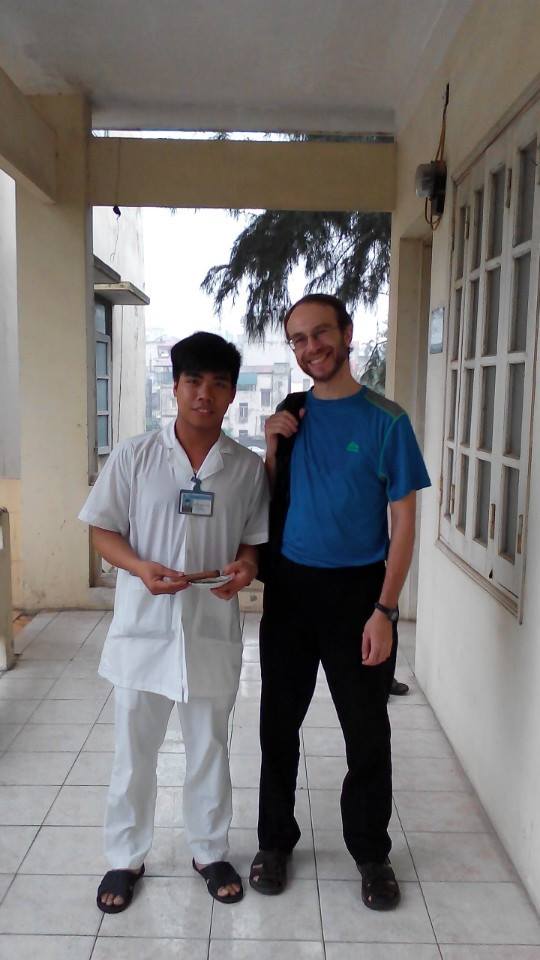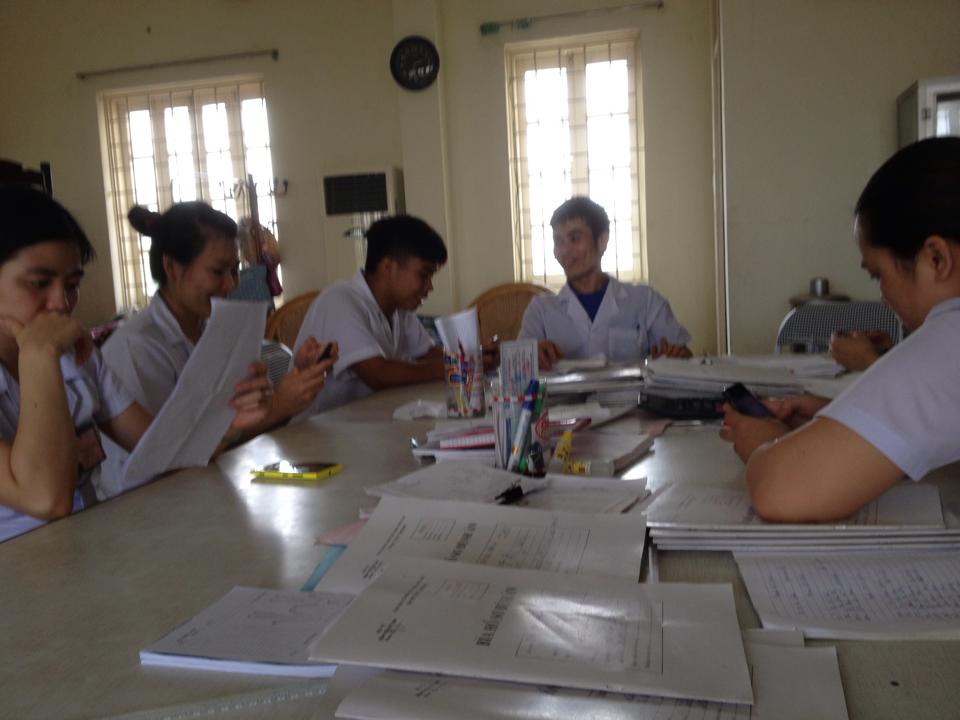I’ve been feeling in need of a tune-up for a while. Over the winter I’ve suffered from a series of colds brought on by cold, damp weather and pollution. I discover to my delight that the National Institute of Traditional Medicine is just round the corner from my house.
The doctor summons someone to translate for me. I’m given a mixed prescription of antibiotics and herbal medicine. The herbal decoction – with around twenty ingredients – is mixed in the dispensary and then cooked in a large room full of elecronically controlled pressure cookers for several hours. For convenience, it’s vacuum sealed into individual doses. They tell me to come back for a tonic once I’ve finished the prescription for the cold. I am about to be precipitated into a complicated engagement with the Vietnamese state medical system.
The herbal medicine is impossibly expensive – over a million dong (£30) for about a week’s worth. I can’t keep that up for the extended period of treatment it would take to restore my energy after several years running on empty.
The following week, I have a conversation with a colleague who’s been living here for eight years. He speaks fluent Vietnamese and is married to a local woman. They have a little daughter. He tells me that she received treatment on the Vietnamese state medical insurance that we all pay into but ignore because everyone at work says it’s useless.
I’ve noticed that the counter where I register at the Institute is marked “Non-insurance patients”. I start to put two and two together, and wonder whether I can use this neglected scheme for traditional medicine treatment. With some difficulty, I persuade my employer to give me my card. I’m registered with a clinic nearby, but they don’t provide traditional medicine. What’s more, when I go there, they say they can’t transfer me to the Institute because it’s a national hospital. They can only transfer me to a local hospital. There’s one 454 Minh Khai street called Det May Hospital.
I get on my bike and look for the address. It’s a horrible ride on congested, pot-holed streets. Evil-natured homicidal motorcyclists barge through the traffic, scowling at anyone who dares disapprove of them running red lights or riding on the wrong side of the road. Weaving through the roaring hordes in the relentless drizzle and choking fumes on Bach Mai street, I pass a corporate suited karaoke trio singing “Under the sunshine in Vietnam.”
Number 450, 452, past a little lane, and then a sign to a hospital. It’s in a huge complex which includes a supermarket, school and apartments, all run by Vincom, which I guess is some kind of state corporation. The hospital is an imposing glass-fronted building. Inside, the floors are gleaming, the lifts work, and I’m shown around with exquisite politeness. I’m some way through the process of registering when the fluent English-speaking receptionist in heart-stoppingly gorgeous formal ao dai (traditional female garment) realises I’m in the wrong place.
My hospital was down that little lane, a much more modest establishment. It’s quite a relief when I finally meet the traditional medicine department. They’re a jovial bunch. I think I’m the first foreigner they’ve treated. Two of the doctors speak enough English to ask me the necessary questions. They invite me to play football with the hospital team on Thursday night.

The author with Dr Luong, traditional department, Det May hospital. Notice his Vietnamese style moxa stick.
I’m familiar with traditional Chinese medicine. The Vietnamese treatment style is a little different. In the Chinese style, moxibustion (use of burning herbs to warm acupuncture points) is done separately from the massage routine, and is more often combined with acupuncture. In Vietnam, the moxa stick is very different, resembling a fat incense stick, and the moxa application is integrated into the rhythm of the massage treatment.
They want to give me a treatment every day for a week. It’s quite a commitment, with a hellish 25-minute bike ride each way, and a good two hours in the hospital. My sleep improves dramatically during the week. I decide not to have a second round of treatment. I just don’t have time. I will carry on with the herbal decoctions. This means I have to re-register, going back to the clinic where my health insurance is registered for a temporary transfer form, and then going through the admissions procedure at my hospital again – blood test, blood pressure, ECG. The ECG suction cups keep falling off my hairy chest, causing much flirtatious hilarity. I have a consultation, but then they have to make the decoction, which means I’ll have to come back again to pick it up. I’m pleasantly surprised to find out that the state medical insurance pays 80% of the treatment costs.
My Vietnamese language teacher has told me about a local type of duck called ngan, which features in various Hanoi dishes. The typical conversation about ngan goes as follows:
“It’s a big, white duck.”
“You mean a goose.”
“No, it’s not a goose, it’s a duck. It’s a big type of duck.”
“You mean a goose.”
“No, a goose is called ngong.” Pronounced with broken tone, this is an onomatopoeic animal name, a bit like a turkey gobble.
“Oh, yes, that’s a goose. Ngan is a big type of duck.”
I have been on both sides of this conversation on different occasions.
There’s a place just across the road from work that sells bun ngan (rice noodle soup with ngan), or at least the sign says so, but they never seem to actually have any.
Coming home after a long morning at Det May Hospital, I’m feeling rather peckish, and there it is, bun ngan, a different place just across the road from work on the other side. It’s generous and delicious, with a deeply flavoured stock and lots of fresh bamboo. I’ve been spun around all day by bureaucracy, battled through the traffic, met some of the nicest people I could imagine, and now I’m settling down to contentment courtesy of this bustling, well-organised street food cafe. I savour, digest and allow Ha Noi’s exuberant madness to transform my brain.
